Anxiety – young people
How to manage your anxiety
Key points about anxiety in young people
- Anxiety is really common.
- There are a lot of life challenges you experience through your teenage and early adult years.
- Here you can find information, resources and services to help you to manage your anxiety.

Anxiety is a feeling of worry, or dread that can make you feel tense, shaky or sick. It might be because of something that’s happening, or going to happen and you fear you won’t cope. You might feel like you want to avoid a situation to make the feeling go away.
Sometimes anxiety can continue, even after whatever was making you anxious has passed or been resolved. Anxiety can also happen without there being a specific reason for it.
Experiencing some anxiety is normal, but if it’s so strong that it interferes with you being able to carry out your normal day-to-day life, it may be an anxiety disorder.
Need help now?
If you’re feeling like you need to talk to somebody now you can free call (0800 376 633) or text (234) Youthline(external link), or the What’s Up(external link) line (0800 942 8787), for 5 to 18 year olds.
When you feel anxious about some potential threat, you start paying attention to possible causes of danger and your anxiety symptoms. It’s tempting to run away from or avoid the thing you’re finding threatening.
This helps for a while but in the longer term it can make your anxiety worse as you get more worried, feel even more like you can’t cope and lose confidence.
You may also try to find ways of managing your anxiety which aren’t healthy or helpful – self-harm, drinking alcohol or finding more ways to avoid the situation. This can become a cycle you get stuck in.
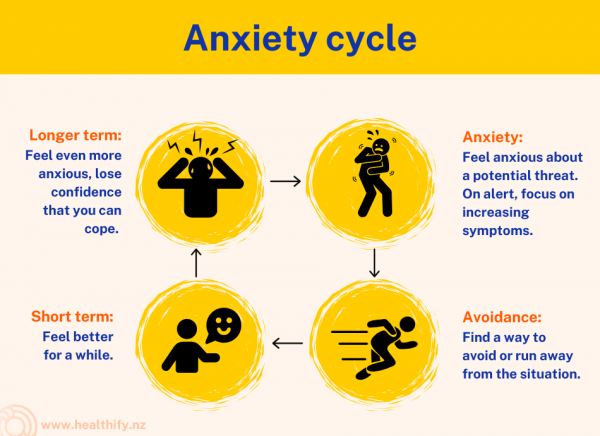
Image credit: Healthify He Puna Waiora
Reversing the cycle
It’s possible to create a positive cycle to help you control your anxiety. If you begin to face the potential threat, rather than finding ways to avoid it, your anxiety symptoms might get worse at first but then they begin to reduce. As you find better ways to manage your symptoms, you’ll get more confident and the next time it won’t be as difficult.
The choices you make every day about how much you move, what you eat, how much sleep you get, whether you take time to relax and whether you smoke or drink are all important for reducing anxiety.
Talk about it
Find somebody you trust to talk to about how you’re feeling. It might be a friend, a member of your whānau, a teacher or a school nurse or counsellor. They can help you make sense of what’s going on and get support if you need more help.
Get to know yourself
Knowing what triggers your anxiety and finding out how you feel, physically and emotionally, can help you understand yourself and how anxiety affects you. Take note of your ‘self-talk’ – the feedback you give yourself or the thoughts you have about yourself when something happens to make you feel anxious. This can help you know what you need to change to help manage your anxiety.
Be aware of avoidance
You may want to avoid the situation you’re feeling anxious about and that might work at first but it won’t make it any better the next time the situation comes up. Try to find ways to manage your anxiety so you can face what you fear – it mightn’t be as bad as you thought!
Below are some things that can help you manage your anxiety.
Exercise
Regular exercise, particularly aerobic exercise, such as walking, swimming or running, is an excellent way of managing stress and tension. Bodies need to move, not sit most of the day. Being active for 30 minutes a day or more is one of the best things you can do to improve your mental and physical health. Exercise encourages your brain to release neurochemicals which can improve your mood and make you feel calmer.
Diet
Your body and mind need good food to feel well. Try eating regular meals, starting with breakfast, and including more fruit and vegetables and more whole foods. Find out more about healthy eating basics.
Caffeine and energy drinks can disrupt your sleep, speed up your heartbeat and increase anxiety.
Sleep
While anxiety can affect your sleep, not getting enough sleep can also contribute to making you more anxious. Make sleep a priority. Follow our sleep tips to help with this.
Relaxation
Taking time to relax each day helps to reduce anxiety. Learn relaxation and breathing exercises or try meditation or yoga. Spend time outside in nature. Do things that you enjoy, make you feel comfortable or lift your mood. Learn more about looking after your mental health.
A New Zealand website called Small Steps has some tools you might find helpful for:
- identifying the signals(external link) that tell you you’re upset
- deep breathing(external link) and mindful watching(external link) to help you relax.
Use grounding techniques
There are many different techniques you can use to help you feel calmer and more in control. They won’t all work for you so it’s good to try several and see which suit you best.
Some are physical or sensory approaches which use your environment and how you sense or feel it to keep you grounded in the here and now.
Some examples are:
- Put both feet on the ground and stamp several times. Move your weight or wiggle your toes and concentrate on the feelings in your toes, feet and legs.
- Dip your face in cold water, or splash cold water on your face, it can help distract you from increasing anxiety.
- Listen to the sounds around you and identify what they are to help locate you in your environment.
- Pick up a stone or another small item nearby, notice it’s texture and weight and how it feels in your hand, whether it’s cool or warm.
Others are mental exercises to focus your mind and pull you out of an anxiety response.
Some examples are:
- Name your family members, think about their ages and something special about them.
- Think about an ordinary, familiar activity and think through each of the steps involved in doing it.
- Play a category game. Choose a category (eg, animals or plants) and name as many things that match the category as you can in a minute or two.
Read more about these and other grounding techniques to help control anxiety(external link).
The Huberman Lab(external link) has podcasts on a range of neuroscience topics including one on tools for managing stress and anxiety.(external link)
Music
Another way of grounding yourself and calming your anxiety is to listen to music. It can trigger positive neurochemicals in your brain and slow your heart rate and breathing rate. It might help to choose some music that helps you process your emotions and build a playlist you can easily find to listen to when you need it. Read more about music and mental health(external link).
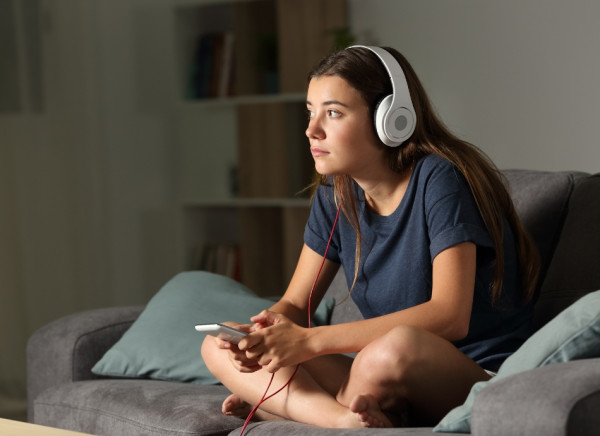
Image credit: Canva
Smoking, alcohol and drugs
Smoking and alcohol have been shown to make feelings of anxiety worse. MDMA, methamphetamine and cannabis can cause anxiety. It’s best not to smoke, drink alcohol or use other drugs at all. If you need help to stop, talk to your healthcare provider or ring Quitline(external link) for advice and support (call 0800 778 778 or text 4006).
Support
Build a support network – a few people you can go to when things are tough. There are also a range of support organisations. Some offer face-to-face meetings where you can talk about your difficulties and problems with other people. Many provide support and guidance over the phone or by email.
Ask your healthcare provider about local support groups for anxiety in your area or contact one of these support groups.
Apps reviewed by Healthify
You might find some mental health and wellbeing apps for rangatahi helpful.
Video: In my mind – teen anxiety(external link) (25:57)
What exactly is anxiety, and why are today’s teenagers more anxious than previous generations? Neuro-educator Nathan Wallis reveals why the brain is more vulnerable to anxiety during adolescence. Teens and parents talk about ways to develop coping skills, build confidence and take back control.

(Attitude Live, NZ)
To view more videos of the same series, visit Attitude Live: In my mind.(external link)
There are lots of things that can help you to manage your anxiety. As well as self-care (the things you can do for yourself) there are many other types of treatment and support available. For example, talking therapy, learning anxiety management techniques and medication.
The first step is to talk to somebody about how you’re feeling. This might be a school nurse or counsellor or a nurse or doctor at your medical centre. They can help you decide what’s the best thing to do next. They may refer you to somebody who specialises in mental health concerns for talking therapy.
Techniques for managing anxiety
By talking to a professional who knows about anxiety and listens to what’s going on for you, you can learn some new skills that make a big difference in how well you manage your anxiety. Instead of the anxiety controlling you and what you do, you can take charge. Things you can do to break out of the cycle of anxiety include:
- understanding anxiety
- accepting and managing normal anxiety (and knowing when yours isn't)
- taking small steps towards doing the things you are worried about coping with, instead of avoiding them
- learning mindfulness
- taking good care of yourself each day
- dealing with issues that need addressing
- getting personal and professional support.
Medication
If you’re anxiety is really bad and is affecting your daily life, you may be prescribed antidepressant medication to take – antidepressant medication also works for anxiety. It works best if you take it every day (not just when you’re feeling anxious) and if you have some talking therapy, such as cognitive behavioural therapy (CBT), as well. This is because the medicine can help with the symptoms of anxiety but won’t make it go away – you need to deal with the reason for your anxiety as well.
It can take a few weeks for antidepressants to work fully and at first your symptoms can appear to get worse before you start to feel better. There can be side effects as well. It’s important to keep talking to whānau, friends and your healthcare provider about how you’re feeling.
Calm your mind(external link) Small Steps, NZ
SPARX, NZ interactive game for young people
Mental Wealth(external link) NZ (especially for young Pacific Peoples)
The Huberman Lab podcasts(external link)
Brochures
Anxiety | Manawapā(external link) Te Pou, NZ
Understanding anxiety(external link) Headspace, Australia
The vicious cycle of anxiety(external link) CCI Health, Australia
Apps
Mental health and wellbeing apps for rangatahi
References
- Understanding anxiety(external link) Headspace, Australia, 2022
- Anxiety(external link) Raising Children, Australia, 2024
- The vicious cycle of anxiety(external link) CCI Health, Australia
- Grounding techniques to help control anxiety(external link) Johns Hopkins University of Medicine, US
- Harmonising music and mental health(external link) Anxiety NZ
See our page Youth health for healthcare providers
Brochures
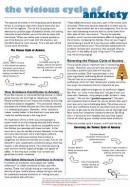
The vicious cycle of anxiety
CCI Health, Australia
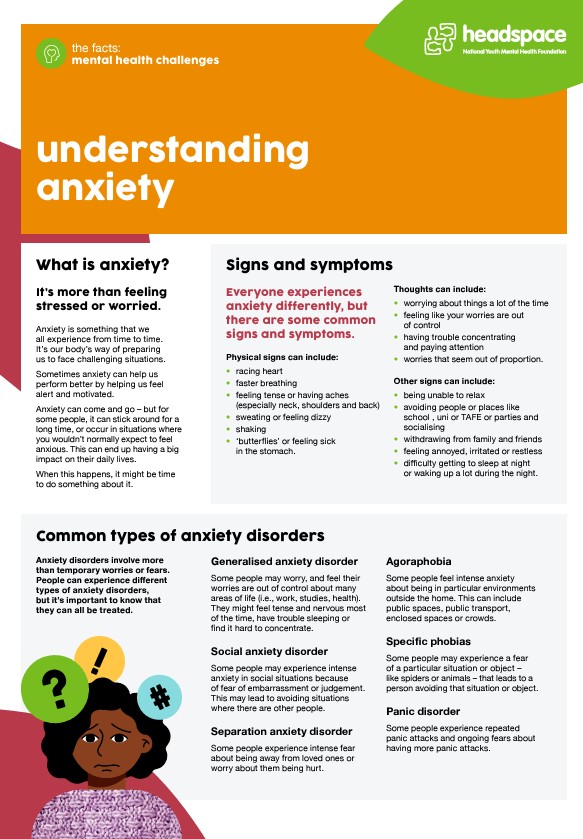
Understanding anxiety
Headspace, Australia
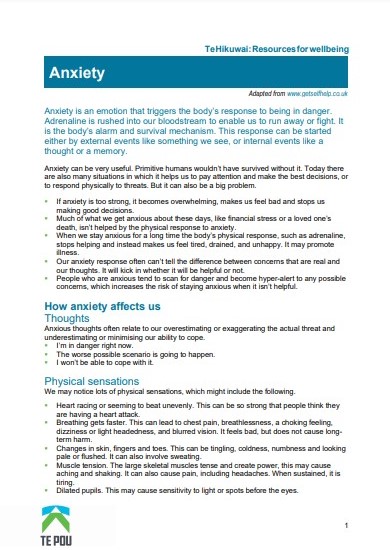
Te Pou, NZ, 2021
Credits: Healthify editorial team. Healthify is brought to you by Health Navigator Charitable Trust.
Reviewed by: Juliet Nelson, RN, Crisis Resolution Team, Health New Zealand | Te Whatu Ora
Last reviewed:





